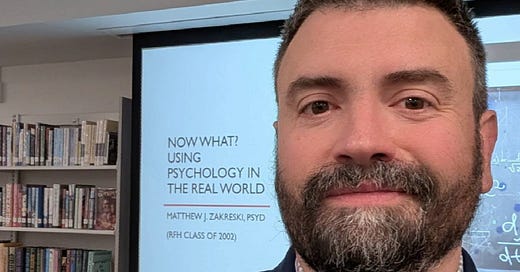As multiple psychologists and writers note, those of us who are neurocomplex and neurodivergent people with autism, ADHD, learning differences, high sensitivity and/or giftedness, can also be more vulnerable to emotional or mental health challenges.
The title of this post is based on comments by Matt Zakreski:
Dr Zakreski: "Increasingly we're seeing language in the field that ADHD autism giftedness dyslexia - those are not mental illnesses, they're neurodivergences, they're different brains.
“Do those conditions come with mental illness? Damn straight - anxiety, depression, social anxiety, panic attacks.
“Framing it that way, it's like you want to have a therapist who speaks neurodedivergent..."
Matt Zakreski, PsyD is a "psychologist, professor, international keynote speaker, published author (The Neurodiversity Playbook), TEDx Speaker, LGBT advocate, neurodiversity ally, and co-founder of The Neurodiversity Collective." [from Facebook profile.]
Learn more in his presentation at Gift-a-Palooza 2025 Feb 6-8.
Summit theme: "Building Resilience with Hope and Creativity Within the Gifted and Neurodiverse Community. We'll have 30+ experts in giftedness and neurodiversity join us for live presentations, workshops and more." [Discount price thru 1/6/25.]
~~~
Neurodiversity Playbook: How Neurodivergent People Can Crack the Code of Living in a Neurotypical World by Matthew Zakreski Psy.D. [Amazon] ... [Bookshop.org]
~~~~
Excerpts from Research Article - An interview with Dr. Matt Zakreski by Michael F. Shaughnessy, Educational Studies, Eastern New Mexico University, Journal of Gifted Education and Creativity 10(2), 131-140, June 2023.
(Read more of this PDF - see link to "Journal of Gifted Education and Creativity" in list of print media on his site.)
This asynchrony impacts gifted kids in two ways the first is that while they are a certain chronological age, their intellectual age is often much greater than their peers.
So gifted kids will seek out intellectual peers rather than chronological peers, which puts them in different social groups and activities that may be harder to find or navigate.
For example, one of my clients is a very talented musician, and like a lot of talented musicians, he had outpaced the music instruction available to him in his current school.
We successfully got him involved in the high school’s marching band even though he's in middle school.
And he enjoys spending time with these students and talking about music, and music theory, and performance.
But when they start talking about high school drama, the prom, dating, and parties, he's completely left out.
So, they're an intellectual appear in some ways, but not in other ways
The second way that this asynchrony impacts gifted kids is their social skills often lag their other skills.
And you'll see a kid who is poised and articulate and thoughtful in class become a silly, immature, weird person when trying to interact with friends.
This weirdness creates anxiety, which of course exacerbates the behaviors in the first place.
So gifted kids often get stuck in these sort of negative feedback loops, where they feel anxious about making friends which causes them to act weird, which pushes their friends away, which makes them more anxious, which makes them act weirder, which pushes more people away. It can be a really painful cycle to watch.
~~~~
The Creative Mind on Substack has more related posts and podcasts - See the Neurodivergent tab at the top of the front page. Here is one example:
Highly Sensitive, Neurodivergent and Misunderstood. How Can We Be Ourselves?
Being a highly sensitive person, or neurodivergent in other ways, we may have grown up feeling misunderstood, and even like we were flawed.
~~~~~






"So gifted kids will seek out intellectual peers rather than chronological peers, which puts them in different social groups and activities that may be harder to find or navigate." This rings exceptionally true as I've seen this with other kids and with my son as well. He can captivate and engage adults in deep thoughts and conversation and yet with many peers his age, he is often not in his element and a bit awkward at times.